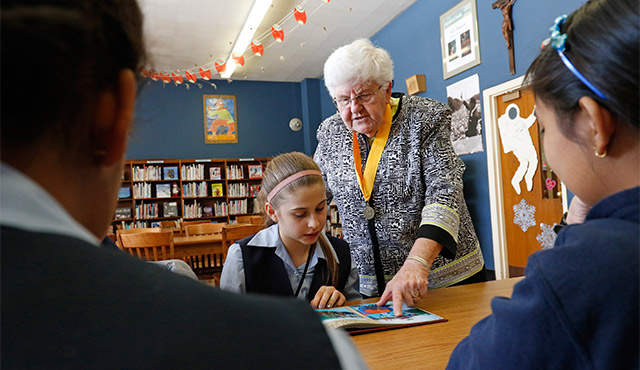Catholic schools have a tremendous benefit to students, families and society, according to a recent document, “Our Catholic Schools in California: A Stellar Past, A Robust Future,” issued by the California Catholic Conference of Bishops.
The purpose of the letter is to reflect on the value of Catholic schools to the Church, the students and families who attend them, their communities and the state, as well as to encourage Catholics and parishes to support and affirm Catholic schools through innovation and commitment.
More than 212,000 students attend Catholic elementary and high schools statewide, the report said, with nearly 17,000 teachers serving the ethnically diverse student bodies. Catholic schools devote millions of dollars to financial assistance to families in poverty so that all are able to experience the blessings of a Catholic education.
“Catholic schools are a valuable resource to the state and have a strong future in California,” said Bishop Edward Clark, auxiliary bishop of the Diocese of Los Angeles and chair of the Conference Committee on Education.
“This pastoral statement is a strong, affirmative, inspirational expression of the value and promise of Catholic school education,” Bishop Clark said. “It emphasizes the bishops’ commitment to Catholic schooling and an ‘Action Plan for Growth and Sustainability’ that includes specific directives, most of them addressed to pastors and Catholic schools, aimed at increasing enrollment and making a Catholic education affordable.”
Catholic education trains students to be thoughtful and creative adults, to inform their conscience and actions with the morals of Catholic teaching, and to emphasize character and values, the report noted.
Students who attend and graduate from Catholic schools are required to perform community service as a way of teaching them the importance of service and living the Corporal Works of Mercy, which instills a lifelong commitment to service and community action.
Perhaps because of that commitment early in their lives, Catholic school graduates are more likely to be civically engaged, more tolerant of diverse views and more committed to service as adults.
The report said that Catholic schools are open to students and families of all religious traditions. “Catholic schools understand the value of religious faith, religious tolerance and religious freedom,” the report noted. “They incorporate these core concepts into their culture and community actions. Christmas and Easter are observed and celebrated, of course, but students also are taught about Jewish, Muslim, Hindu, Buddhist and other faith traditions, and to respect people who practice other religions.”
Interestingly, minority students are 42 percent more likely to graduate from high school if they attend Catholic school, and are 2.5 times more likely to attend college or university, according to the report.
It said Catholic school students go on to earn higher average incomes, participate more in community activities and have a greater propensity to vote.
In addition, California public schools reap $2.2 billion annually in subsidies from families with students attending Catholic schools instead of public schools. That’s equivalent to almost $250 per pupil per year – money that could be spent to help give teachers and parents a tax break, expand opportunities for childhood education for those most in need, or provide additional services for students.
Catholic schools have a robust future, the report said, because the children they educate today will become tomorrow’s leaders for both Church and society.
“As we commit ourselves to support and promote our statewide network of Catholic schools, let all of us – clergy, laity, state and civic leaders – remember the blessing and gift that Catholic schools have been for generations of students, many of whom were newly arrived immigrants with dreams and hopes for a better life,” the report concluded.
“They were education by modern saints, primarily women religious, whose tireless effort and dedication ensured that their students grew strong in faith and intellect, and led lives of leadership and service to the common good.”

